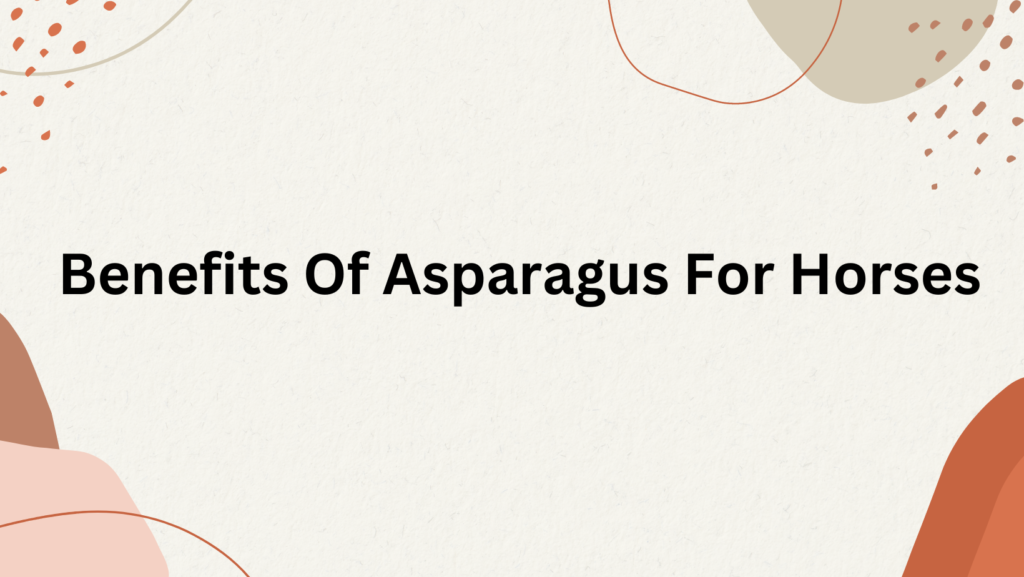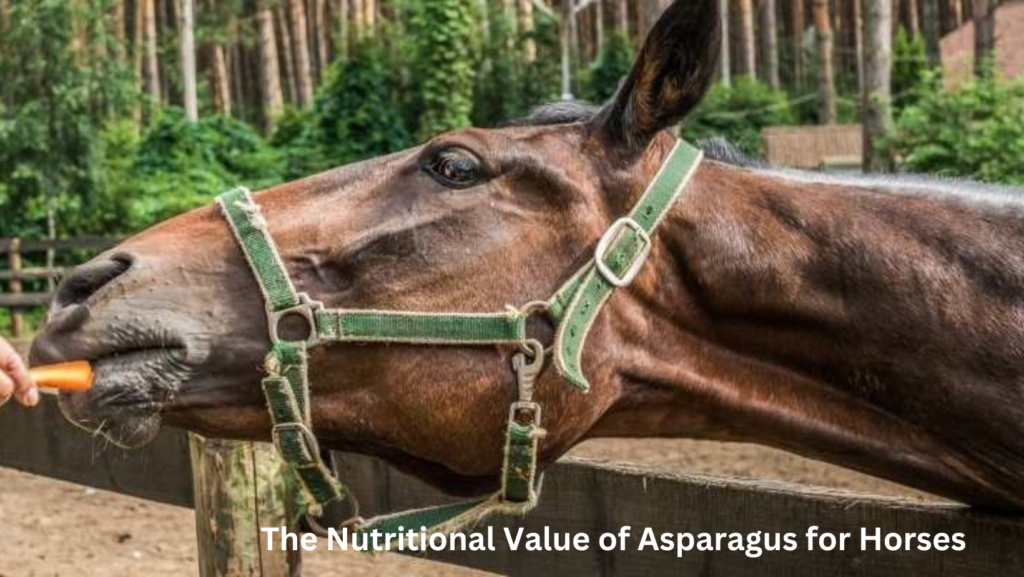Asparagus is a healthy vegetable that is packed with nutrients, and it is safe for horses to eat. In fact, asparagus can be a good addition to a horse’s diet as it is a good source of vitamins A and C, as well as iron and fiber.
However, it is important to feed asparagus to horses in moderation, as too much of this vegetable can cause digestive issues. When feeding asparagus to horses, it is best to chop it up into small pieces so that they can easily digest it.

What benefits Of Asparagus For Horses?
Horses are typically very active animals, and as such, they require a diet that is rich in nutrients in order to maintain their health and vitality. Asparagus is a vegetable that is packed full of nutrients that are essential for horses, and as such, it can be a great addition to their diet. Some of the benefits of asparagus for horses include:
1. Asparagus is rich in vitamins and minerals. Horses need a diet that is rich in vitamins and minerals in order to stay healthy, and asparagus is a great source of both. It is especially high in vitamins A and C, which are important for horses’ skin, coat, and immune system health.
2. Asparagus is a good source of fiber. Fiber is important for horses for a number of reasons, including keeping their digestive system healthy. Asparagus is a good source of both soluble and insoluble fiber, which can help horses to maintain a healthy gut.

3. Asparagus is low in sugar. Many horse feeds are high in sugar, which can lead to health problems such as obesity and laminitis. Asparagus is a low-sugar vegetable, which makes it a great option for horses that are prone to these conditions.
4. Asparagus has anti-inflammatory properties. Inflammation is a common issue in horses, and asparagus has been shown to have anti-inflammatory properties. This can help to reduce the severity of conditions such as arthritis and tendonitis.
Overall, asparagus is a nutrient-rich vegetable that can provide a number of benefits for horses. If you are looking for a way to improve your horse’s diet, asparagus is a great option.
Risks Of Horses Eating Asparagus
Horses are known to be curious creatures, and they will often try to nibble on anything that catches their eye. This can sometimes lead to them eating things that are not good for them, like asparagus. Asparagus is a member of the lily family, and all parts of the plant are poisonous to horses. If a horse eats even a small amount of asparagus,

it can lead to serious health problems. Some of the symptoms of asparagus poisoning in horses include difficulty breathing, weakness, and collapse. If you think your horse has eaten asparagus, it is important to contact a veterinarian immediately.
Is Asparagus Good For Horses?
Yes, asparagus is good for horses. Asparagus is a nutritious vegetable that is rich in vitamins and minerals, and it also contains a compound called asparagine, which has been shown to have anti-inflammatory properties.
As a result, asparagus can be beneficial for horses that suffer from conditions such as arthritis or joint pain. In addition, asparagus is a natural diuretic, which means it can help horses to expel excess water and toxins from their bodies.
The Nutritional Value of Asparagus for Horses
Asparagus is a nutrient-rich vegetable that can be a valuable addition to your horse’s diet. This vegetable is a good source of vitamins A, C, and E, as well as potassium, selenium, and fiber. Asparagus can help to promote a healthy digestive system, and the fiber content can also help to regulate blood sugar levels.

This vegetable is also low in calories and fat, making it a good choice for horses that are overweight or have diabetes. When feeding asparagus to your horse, it is important to chop it into small pieces to prevent choking.
How to feed asparagus to horses?
Horses are known to be very sensitive to changes in their diet, so it’s important to introduce asparagus slowly and in small quantities. The best way to do this is to mix asparagus with their regular feed, gradually increasing the amount of asparagus over time.
Asparagus is a rich source of vitamins and minerals and can be a healthy addition to a horse’s diet. However, as with any new food, it’s important to introduce it slowly to avoid any stomach upset.

If you’re unsure about how to feed asparagus to your horse, it’s always best to consult with a veterinarian or equine nutritionist.
Conclusion
In summary, while horses can technically consume asparagus, it is not a recommended addition to their diet. The fibrous texture and potential for digestive upset make it less than ideal for our equine friends. It’s crucial to prioritize a balanced diet that consists primarily of hay, grasses, and specially formulated grains or feeds designed for horses.
If you’re looking to treat your horse with fresh vegetables, there are plenty of safer and more digestible options available. Always consult with your veterinarian before introducing any new foods to ensure that it aligns with your horse’s specific health needs.
Ultimately, keeping your horse’s health and well-being at the forefront of your feeding choices will ensure they remain strong, happy, and full of energy for all their adventures. So, while asparagus may be a delightful vegetable for humans, it’s best left off the horse’s plate!
Read More:

